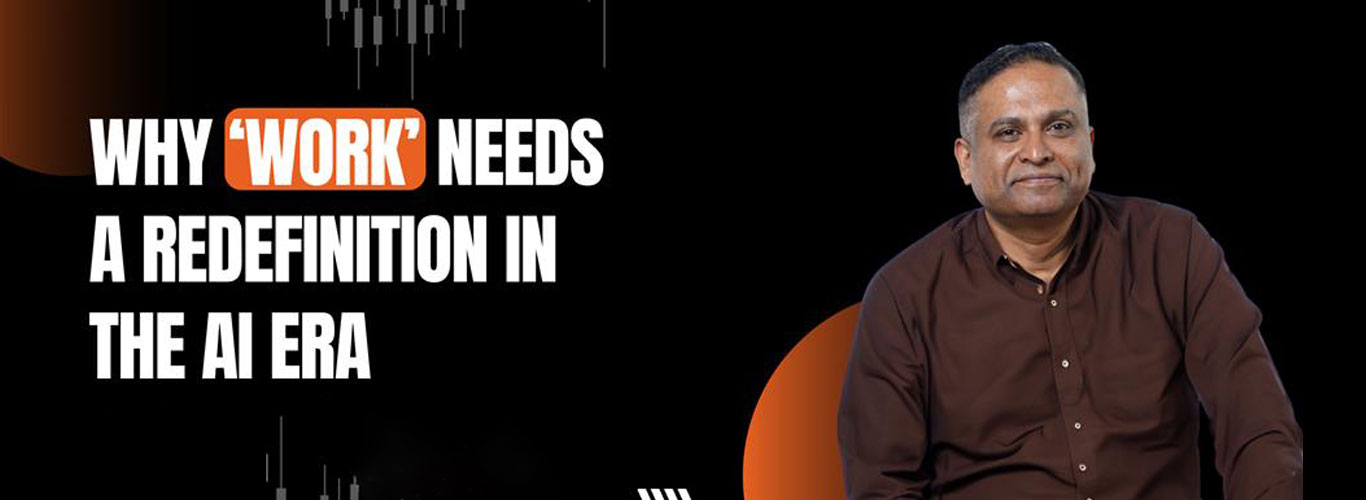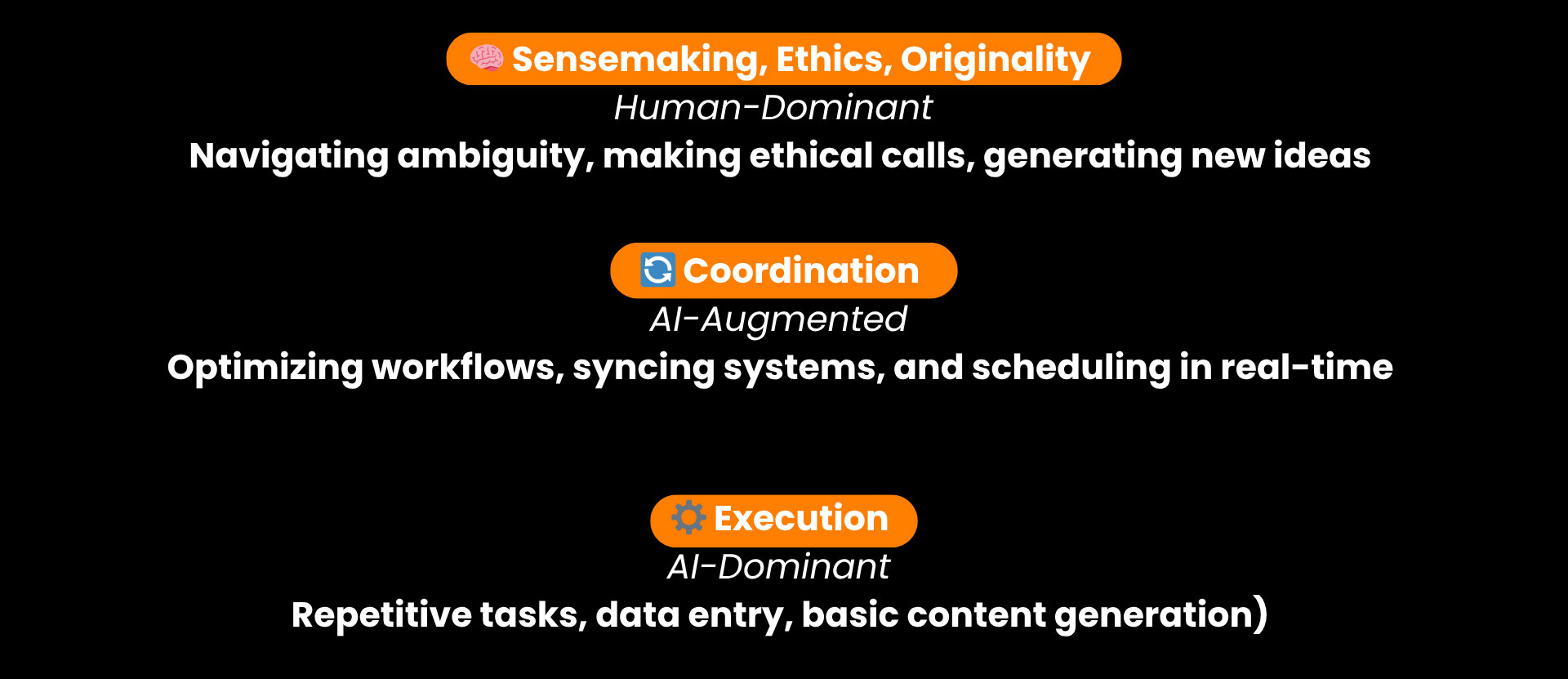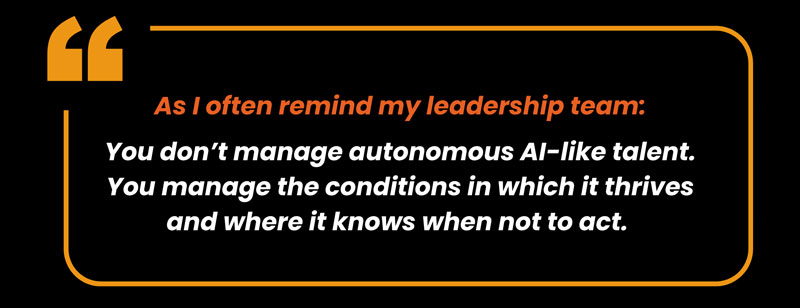Why ‘Work’ Needs a Redefinition in the Age of Agentic AI?
If AI can work for us, think, plan, and act, then what exactly are we here to do?
This is a familiar question that has been ringing in our minds since the inception of AI and automation.
Let’s get one thing straight: the old version of “work” is done.
We’re not just automating repetitive tasks anymore. AI has levelled up. It can now make decisions, learn on the fly, plan entire workflows, and act independently. This kind of autonomy changes everything.
Nearly half of major enterprise workflows now include autonomous AI agents. I am not talking about tools, but agents. Things that don’t wait for instructions, they figure things out and move.
This is a shift no organization chart can ignore.
So here’s the big question I’m asking, and I think every leader needs to be asking too:
If AI can work for us, then what’s the uniquely human piece we have to protect, elevate, and rethink?
Work ≠ Tasks Anymore: The New Cognitive Divide
We’ve always thought of work as a series of tasks. Break the big goal into smaller blocks. Complete, check, repeat.
But AI has shifted the game. Not by replacing every task, but by redrawing the boundaries of cognition itself.
Here’s the new hierarchy:
- AI-dominant Execution: From data entry to content generation, AI now thrives in precision and repetition.
- AI-augmented Coordination : Workflow optimization, cross-system sync, and real-time scheduling are increasingly AI-assisted.
- Human-dominant decision making, ethics, originality: Navigating ambiguity, balancing ethics, creating new ideas, this is where humans still lead.
The critical shift isn’t about what AI can do, it’s about what humans must do differently.
We are no longer managing tasks.
We are managing intelligence.
Work as Identity: The Silent Crisis
Here’s the part that doesn’t make the headlines.
AI isn’t just changing productivity, it’s also shaking the identity.
For many professionals, “work” is far more than function. It’s how we define ourselves. How we feel useful. How we find meaning. Effort has long equalled value.
But what happens when effort isn’t required?
A recent Edelman survey showed that nearly 65 percent of tech executives worry that
AI will lead to a loss of human intellectual capabilities.
That’s not a skills gap. That’s an identity crisis.
And it’s not something we can fix with another upskilling program.
Reskilling is not enough. We must help people rewrite their attitude towards AI.
We must move from training for efficiency to preparing for reinvention, not just of capabilities, but of confidence. And that starts at the top.
Leadership in the Age of Autonomy: From Control to Design
This shift demands a new kind of leadership.
Traditional hierarchies, built on control, reporting lines, and decision approval layers are ill-equipped for the speed and autonomy of AI.
To lead in the age of autonomous AI, we must:
- Architect trust boundaries between humans and machines.
- Design for transparency and auditability so AI decisions can be explained, questioned, and corrected.
- Create spaces for co-creation, where human intuition and machine precision enhance one another.
As I often remind my leadership team:
You don’t manage autonomous AI-like talent. You manage the conditions in which it thrives and where it knows when not to act.
Strategic Imperatives: Redesigning Work at the Root
If you’re a CEO, here’s where your attention needs to go:
1. Unbundle Roles
Stop thinking of static job titles. Start thinking in dynamic capability ecosystems. In a world of AI autonomy, roles must be modular, fluid, and built around outcomes, not tasks.
Example: Instead of hiring a “sales manager,” you may need someone who can orchestrate AI agents, analyze customer sentiment in real-time, and inject human creativity at critical junctures.
2. Build AI-Fluent Teams
AI fluency isn’t just for data scientists. Your product managers, designers, operations lead, and even your legal teams need to understand how to leverage, audit, and govern AI. Hybrid teams, part human, part machine are the new normal.
3. Institutionalize new roles and redefine work
This is not an HR initiative. This is a board-level imperative.
Just as we once embraced digital transformation as a core strategic shift, we now need to treat the redefinition of work as a permanent function, reviewed, budgeted, and owned by leadership.
Redefining the Traditional Workplace Culture
Let’s be clear: AI hasn’t erased work.
It’s matured it.
It’s stripped away the mechanical and left us with the meaningful. The ambiguous.
The moral. The imaginative. The human.
That’s the paradox: as AI becomes more capable, human contribution becomes more precious and more difficult to define.
So where do we go from here?
We double down on the things that make us irreplaceable:
Ethics
AI is brilliant at optimization. It’ll maximize outputs, crunch data, and move at lightning speed. But here’s the thing, it has no moral compass.
That’s our job.
We’re the conscience of the system. And we better show up with clarity and courage.
Imagination
AI is great at remixing what already exists. It can draw from the past and simulate the present but it doesn’t dream.
Imagination is what lets us connect the dots no one else sees, leap into the unknown, and build futures we haven’t lived yet.
If you’re looking for breakthrough ideas, bold visions, or game-changing pivots, that’s not code. That’s creativity. And that still belongs to us.
Strategic Orchestration
AI can optimize toward a goal, but it can’t define what the goal should be.
In the age of intelligent systems, someone still needs to zoom out, define the why, balance competing priorities, and align action to vision.
We don’t just use AI. We guide it. And that starts with setting a clear, human-centered mission.
The most important job of the AI era is redefining what a job even is.
The future won’t be built by those who cling to legacy models of work, it will be built by those bold enough to reimagine it and restructure it.
So I’ll leave you with this:
If work as we knew it is gone, what do we want to build in its place?
Because now, we get to choose!







